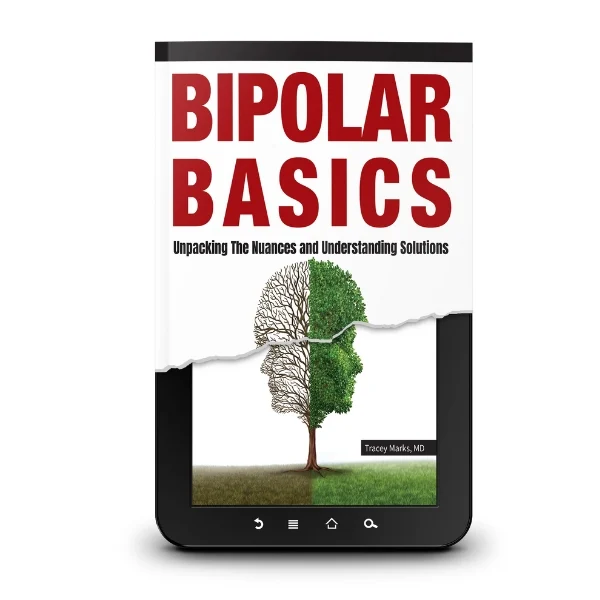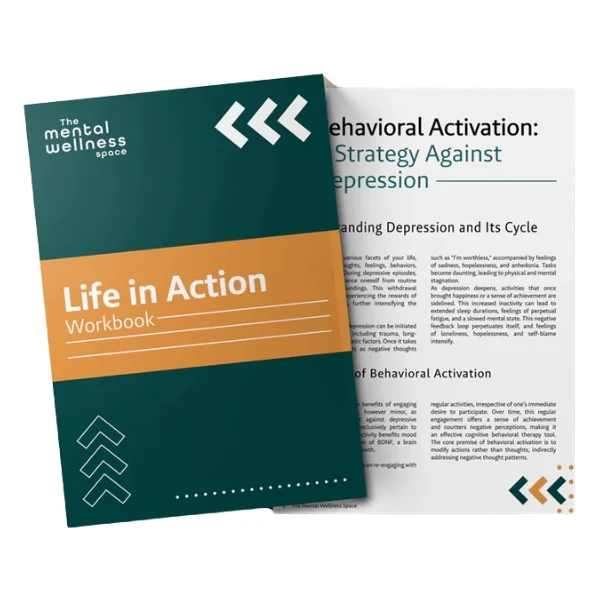Managing Bipolar Disorder and ADHD
The coexistence of bipolar disorder and ADHD presents a complex challenge, particularly when it comes to medication management. Stimulants, often prescribed for ADHD, can raise concerns for individuals with bipolar disorder due to their potential to trigger mood swings or worsen existing symptoms.
Products To Support You

Bipolar Basics Guide Ebook

Life In Action Digital Workbook
Understanding the Scenario
Let’s consider the case of Chad. Chad has been diagnosed with several conditions, including anxiety, ADHD, PTSD, and more recently, bipolar disorder. His treatment regimen includes two stimulants (Vyvanse and Adderall), an antidepressant, Klonopin, and pain medications for a physical condition. Recently, Chad had to switch clinics due to a change in his insurance, and his new provider refused to refill his stimulants, citing concerns about their use in people with bipolar disorder. Chad is understandably worried, as he has relied on these medications since high school to manage his ADHD and fears failing in grad school without them.
The Risk of Stimulants in Bipolar Disorder
In general, stimulants are not recommended for people with bipolar disorder. Bipolar disorder is characterized by episodes of depression and mania or hypomania.
Stimulants can potentially trigger psychotic episodes, induce rapid cycling, or cause mixed episodes. Rapid cycling involves experiencing four or more mood episodes within a year, while mixed episodes involve simultaneous symptoms of depression and mania, making them particularly challenging to treat.
Despite these risks, stimulants are not entirely off-limits. The effects of stimulants can vary from person to person. Some individuals with bipolar disorder might not experience negative effects from stimulants, especially if their ADHD symptoms significantly impact their daily functioning.
Balancing ADHD and Bipolar Disorder
It’s often challenging to differentiate between attention problems stemming from ADHD and those arising from bipolar disorder. For some, treating the mood symptoms associated with bipolar disorder can stabilize attention and focus to a manageable level. However, those with moderate to severe ADHD may still require separate treatment for their ADHD symptoms.
When treating a person with both ADHD and bipolar disorder, it’s crucial to ensure that their mood is stabilized with robust mood stabilizers before introducing stimulants. Starting with a small dose of a stimulant and closely monitoring for signs of mania or instability is essential. Stimulants work quickly and their effects can be observed within hours, unlike antidepressants or mood stabilizers that take weeks to show results.
Chad’s Unique Situation
Chad’s case is slightly different since his ADHD diagnosis and stimulant use preceded his bipolar disorder diagnosis. This is common, as ADHD typically manifests in childhood, while bipolar disorder often develops later. Chad has safely taken stimulants for years without adverse effects on his bipolar disorder, which suggests a lower risk for destabilization upon continuing their use. However, it’s still vital for Chad to remain vigilant for any signs of instability.
A notable concern in Chad’s treatment is the concurrent use of stimulants and antidepressants. The use of antidepressants in bipolar disorder is controversial, as they can induce mania or rapid cycling in some individuals. Typically, mood stabilizers should be prioritized, and antidepressants used cautiously, often in conjunction with mood stabilizers to mitigate risks.
Optimizing Treatment
For Chad, an optimal treatment plan might involve tapering off the antidepressant, ensuring robust mood stabilization, and then continuing the stimulants for ADHD. This approach might also necessitate adding a second mood stabilizer for added protection against the potential destabilizing effects of stimulants.
Chad’s use of two different stimulants, Vyvanse (a long-acting stimulant) and Adderall (a short-acting stimulant), is also worth considering. Long-acting stimulants are often sufficient for the average workday, but those with extended schedules might benefit from an additional short-acting stimulant later in the day. However, taking stimulants late in the day requires caution to avoid sleep disturbances.
Conclusion
Managing both bipolar disorder and ADHD requires careful consideration and a tailored approach. While stimulants pose risks for people with bipolar disorder, they are not universally contraindicated. Each individual’s treatment plan should be closely monitored and adjusted based on their unique needs and responses to medication.
If you want to learn more about differentiating between bipolar disorder and ADHD, watch my video on the topic. For a deeper dive into the nuances of bipolar disorder, check out my ebook, “Bipolar Basics.”

